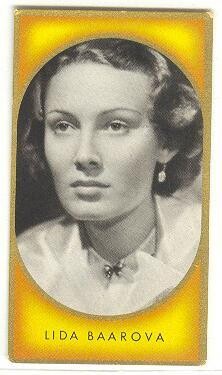
Lída Baarová #61 Czech/German beauty/actress 1930s-40s
Lída Baarová ~ This is a vintage original cigarette card form the series Bunte Filmbilder from Lloyd Cigarettes. Issued in 1936. This is card #61. It is about the size of a traditional US cigarette card (about 1½" x 2 2/8"). This particular example is in excellent condition.
People who used to know Lída Baarová reminisce that she was the most beautiful woman they have ever seen. She studied acting at Prague Conservatory and got her first movie role in a Czech film at the age of 17 in 1931. In Berlin she met Gustav Fröhlich, an actor in the German cinema, and starred in several films with him. In 1935, following her successful appearance in the German film Barcarole, she received several job offers from the Hollywood studios. She turned them down, but later regretted it and commented I could have been as famous as Marlene Dietrich.
After her engagement to Gustav Fröhlich, she and her fiancé moved to the Schwanenwerder peninsula on the outskirts of Berlin, where their house on the (later named) Karl-Marx-Straße 8 was close to the residence of Joseph Goebbels on Inselstraße 8. Joseph Goebbels was a minister in Chancellor Hitler's administration, with a decisive voice in German movie production. Lída Baarová met Joseph Goebbels while working for Ufa films. They started a passionate love affair which lasted for over a year and caused her breakup with Gustav Fröhlich.
After Goebbels' wife Magda, learned about this affair, she complained to Adolf Hitler. Hitler, who himself was not immune to Baarová's beauty, was the godfather of Goebbels' children, and sympathetic towards Magda; he asked Goebbels to end the affair. Goebbels offered his resignation instead. He wanted to divorce his wife, marry Lída Baarová, and leave Germany with his Liduška, (Czech diminutive of Lída, connoting love), as he affectionately called her, for Japan. However, Hitler did not accept his resignation. On October 15, 1938, Joseph Goebbels attempted suicide.
Shortly afterwards, Lída Baarová received a call from the German police that she was a persona non grata and was given consilium abeundi to leave Germany. She went to Prague and, in 1941, to Italy, where she starred in such movies as Grazia (1943), La Fornarina (1944), Vivere ancora (1945), and others. After American troops occupied Italy, she returned to Prague, where she dated her old friend Hans Albers, another of Germany's movie idols. In April of 1945, Lída Baarová left Prague for Germany, to join Albers in his country house on the shores of Lake Starnberg. On the way, she was taken into custody by the American military police, imprisoned in Munich, and later extradited to Czechoslovakia.
In Czechoslovakia, Baarová faced a death sentence for her work with the Germans during the war, but she was able to prove that she worked in Germany before the war and received only a prison sentence. Thus, in a way, her love affair with Joseph Goebbels and subsequent expulsion from Germany saved her life. In prison, she was often visited by Jan Kopecký who, like many others, was infatuated with her. Kopecký was a close relative of a prominent politician in the post-war government of Czechoslovakia who arranged Lída's release from prison. Jan Kopecký and Lída Baarová were married in 1949 and formed an itinerant troupe playing marionettes before they escaped to Austria. From there, Kopecký immigrated to Argentina, leaving Lída behind to recuperate in the sanatorium of Dr. Lundwall.
In Austria, Lída attempted a comeback, but Anton Walbrook, who was persecuted during the war for his sexual orientation, withdrew from a film where he was cast with her. To escape the resulting hate media campaign, she left for Argentina, where she lived in extreme poverty. She decided to return to Italy. Her husband stayed in Argentina and they were divorced in 1956. Back in Italy, she appeared in several films, including Fellini's I Vitelloni (1953), where she played a Chinese girl. In 1958, she moved to Salzburg, where she performed in a theater. In 1970, she married Kurt Lundwall, a physician 20 years her senior. In the same year, Rainer Werner Fassbinder gave her a part in The Bitter Tears of Petra von Kant.
In the 1990s Lída Baarová reappeared on the cultural scene of the Czech Republic. She published her autobiography and a movie, Lída Baarová's Bittersweet Memories, appeared in 1995 and won an award at the 1996 Art Film Festival in Trencianske Teplice, Slovakia. Lída Baarová suffered from Parkinson's disease and died in 2000 in Salzburg, while living alone on the estate she inherited after the death of her second husband, Dr. Lundwall.
